《新概念英语》第二册第6课
- 格式:docx
- 大小:26.22 KB
- 文档页数:7
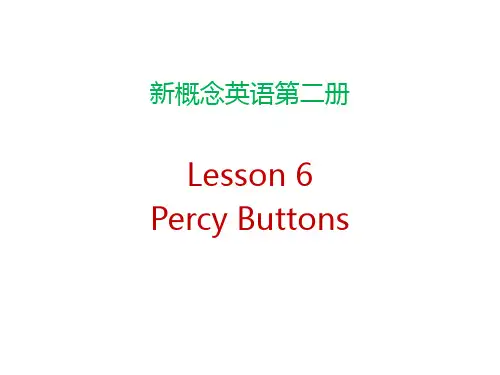

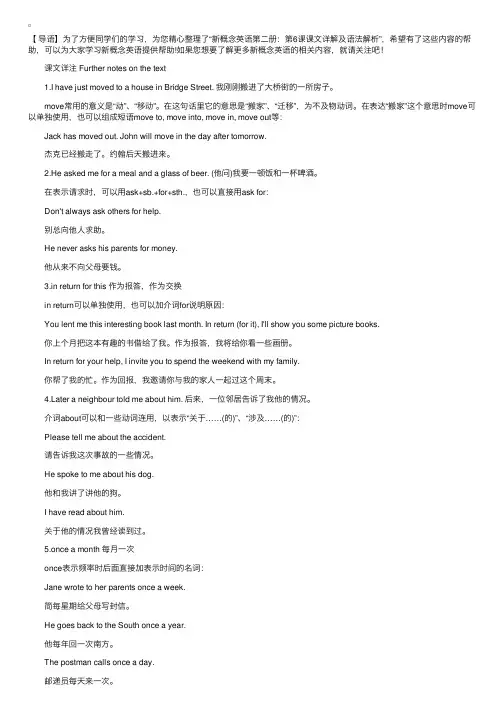
【导语】为了⽅便同学们的学习,为您精⼼整理了“新概念英语第⼆册:第6课课⽂详解及语法解析”,希望有了这些内容的帮助,可以为⼤家学习新概念英语提供帮助!如果您想要了解更多新概念英语的相关内容,就请关注吧! 课⽂详注 Further notes on the text 1.I have just moved to a house in Bridge Street. 我刚刚搬进了⼤桥街的⼀所房⼦。
move常⽤的意义是“动”、“移动”。
在这句话⾥它的意思是“搬家”、“迁移”,为不及物动词。
在表达“搬家”这个意思时move可以单独使⽤,也可以组成短语move to, move into, move in, move out等: Jack has moved out. John will move in the day after tomorrow. 杰克已经搬⾛了。
约翰后天搬进来。
2.He asked me for a meal and a glass of beer. (他问)我要⼀顿饭和⼀杯啤酒。
在表⽰请求时,可以⽤ask+sb.+for+sth.,也可以直接⽤ask for: Don't always ask others for help. 别总向他⼈求助。
He never asks his parents for money. 他从来不向⽗母要钱。
3.in return for this 作为报答,作为交换 in return可以单独使⽤,也可以加介词for说明原因: You lent me this interesting book last month. In return (for it), I'll show you some picture books. 你上个⽉把这本有趣的书借给了我。
作为报答,我将给你看⼀些画册。
In return for your help, I invite you to spend the weekend with my family. 你帮了我的忙。
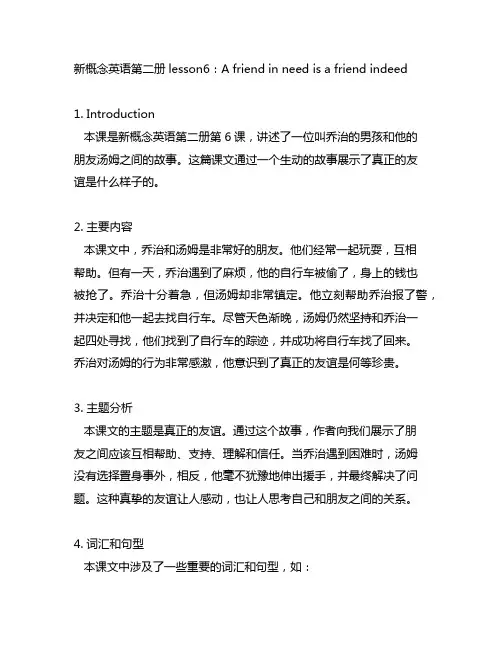
新概念英语第二册lesson6:A friend in need is a friend indeed1. Introduction本课是新概念英语第二册第6课,讲述了一位叫乔治的男孩和他的朋友汤姆之间的故事。
这篇课文通过一个生动的故事展示了真正的友谊是什么样子的。
2. 主要内容本课文中,乔治和汤姆是非常好的朋友。
他们经常一起玩耍,互相帮助。
但有一天,乔治遇到了麻烦,他的自行车被偷了,身上的钱也被抢了。
乔治十分着急,但汤姆却非常镇定。
他立刻帮助乔治报了警,并决定和他一起去找自行车。
尽管天色渐晚,汤姆仍然坚持和乔治一起四处寻找,他们找到了自行车的踪迹,并成功将自行车找了回来。
乔治对汤姆的行为非常感激,他意识到了真正的友谊是何等珍贵。
3. 主题分析本课文的主题是真正的友谊。
通过这个故事,作者向我们展示了朋友之间应该互相帮助、支持、理解和信任。
当乔治遇到困难时,汤姆没有选择置身事外,相反,他毫不犹豫地伸出援手,并最终解决了问题。
这种真挚的友谊让人感动,也让人思考自己和朋友之间的关系。
4. 词汇和句型本课文中涉及了一些重要的词汇和句型,如:- a friend in need is a friend indeed- lose one's money- feel helpless- be in trouble- ask for help- offer to do读者在学习本课文时,可以重点关注这些词汇和句型的应用,对于提高英语水平和语感有着重要作用。
5. 思考与反思本课文是一篇小品文,通过一个简短而生动的故事,向我们传递了深刻的友情和人性的思考。
在我们的日常生活中,我们可能会遇到很多麻烦和困难,而真正的朋友就是能在这些时候给你力量和支持的人。
我们也应该在朋友需要帮助的时候,给予他们真诚的帮助和关怀。
6. 结束语本篇课文通过生动的故事向我们展示了真正的友谊的意义,也让我们对自己和朋友之间的关系有了更深入的思考。
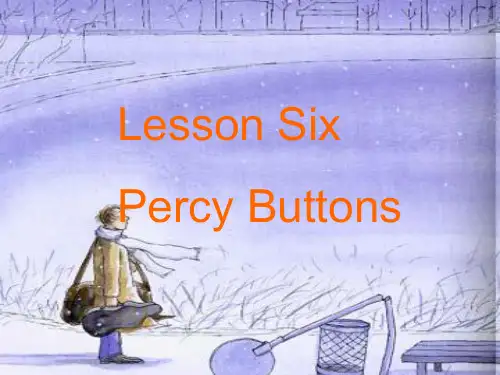
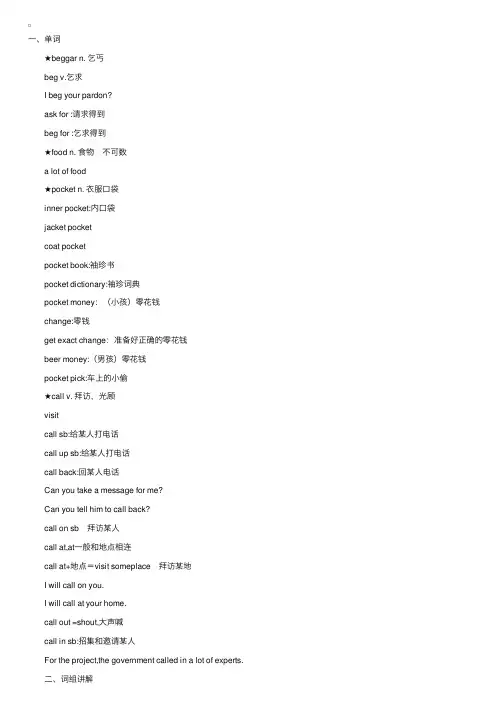
⼀、单词 ★beggar n. 乞丐 beg v.乞求 I beg your pardon? ask for :请求得到 beg for :乞求得到 ★food n. ⾷物 不可数 a lot of food ★pocket n. ⾐服⼝袋 inner pocket:内⼝袋 jacket pocket coat pocket pocket book:袖珍书 pocket dictionary:袖珍词典 pocket money:(⼩孩)零花钱 change:零钱 get exact change:准备好正确的零花钱 beer money:(男孩)零花钱 pocket pick:车上的⼩偷 ★call v. 拜访,光顾 visit call sb:给某⼈打电话 call up sb:给某⼈打电话 call back:回某⼈电话 Can you take a message for me? Can you tell him to call back? call on sb 拜访某⼈ call at,at⼀般和地点相连 call at+地点=visit someplace 拜访某地 I will call on you. I will call at your home. call out =shout,⼤声喊 call in sb:招集和邀请某⼈ For the project,the government called in a lot of experts. ⼆、词组讲解 1、knock [动词] ①敲,打(某物) 例句:He knocked several times on the window. 他敲了⼏下窗。
②批评,数落 例句:This magazine seems to be fond of knocking Lindsay Lohan's private life. 这家杂志似乎很热衷挖苦林赛o罗韩的私⽣活。
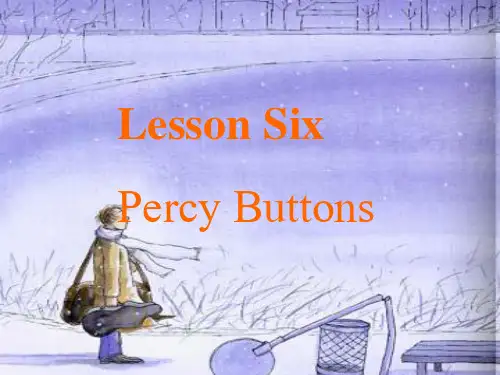
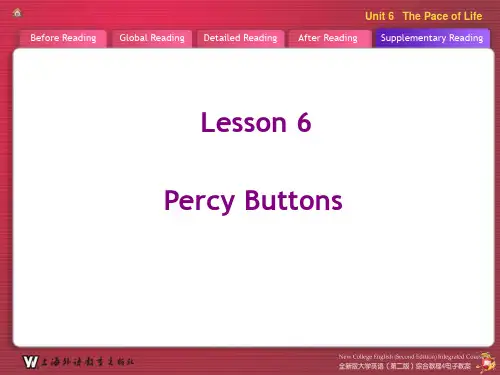

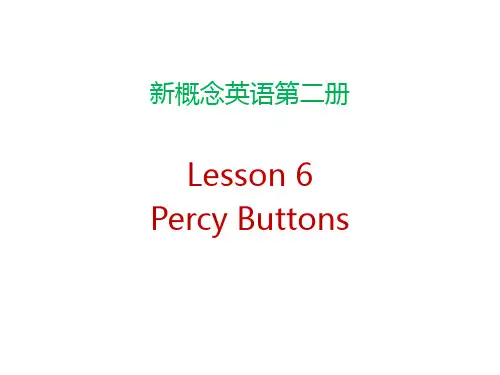

新概念英语第二册第6课:Percy ButtonsLesson 6 Percy Buttons泊西·巴顿斯听录音,然后回答以下问题。
Who is Percy Buttons?I have just moved to a house in BridgeStreet. Yesterday a beggar knocked at mydoor.我刚刚搬进了大桥街的一所房子。
昨天一个乞丐来敲我的门,He asked me for a meal and a glassof beer. In return for this, the beggarstood on his head and sang songs.问我要一顿饭和一杯啤酒。
作为回报,那乞丐头顶地倒立起来,嘴里还唱着歌。
I gavehim a meal. He ate the food and drankthe beer. Then he put a piece of cheesein his pocket and went away.我给了他一顿饭。
他把食物吃完,又喝了酒。
然后把一块乳酪装进衣袋里走了。
Later aneighbour told me about him. Everybodyknows him. His name is Percy Buttons.后来,一位邻居告诉了我他的情况。
大家都认识他,他叫珀西.巴顿斯。
He calls at every house in the street once a month and always asks for a meal and aglass of beer.他每月对这条街上的每户人家光顾一次,总是请求给他一顿饭和一杯啤酒。
New words and expressions 生词和短语beggarn. 乞丐foodn. 食物pocketn. 衣服口袋callv. 拜访,光顾Notes on the text课文注释1 He asked me for a meal and a glass of beer.他问我要一顿饭和一杯啤酒。
新概念英语第二册:第6课课文详解及语法解析课文详注 Further notes on the text1.I have just moved to a house in Bridge Street. 我刚刚搬进了大桥街的一所房子。
move常用的意义是“动”、“移动”。
在这句话里它的意思是“搬家”、“迁移”,为不及物动词。
在表达“搬家”这个意思时move可以单独使用,也可以组成短语move to, move into, move in, move out等:Jack has moved out. John will move in the day after tomorrow.杰克已经搬走了。
约翰后天搬进来。
2.He asked me for a meal and a glass of beer. (他问)我要一顿饭和一杯啤酒。
在表示请求时,可以用ask+sb.+for+sth.,也可以直接用ask for:Don't always ask others for help.别总向他人求助。
He never asks his parents for money.他从来不向父母要钱。
3.in return for this 作为报答,作为交换in return可以单独使用,也可以加介词for说明原因:You lent me this interesting book last month. In return (for it), I'll show you some picture books.你上个月把这本有趣的书借给了我。
作为报答,我将给你看一些画册。
In return for your help, I invite you to spend the weekend with my family.你帮了我的忙。
作为回报,我邀请你与我的家人一起过这个周末。
ter a neighbour told me about him. 后来,一位邻居告诉了我他的情况。
lesson 6 Percy Buttons一、生词和短语(词汇学习)词汇学习★knockknock at 敲(门窗等) ;knock at the door 敲门knock off: 下班,He knocked off earlier.knock sth off+ 地点:把某物从某处碰翻;knock the vase off the tableknock off: 打折,knock 10% off the price. 把价格降低10%。
knock over:打翻,碰翻 A car knocked the boy over. He knocked a glass over. 他把玻璃杯打翻了。
如果有地点,off; 无地点,over,I knocked the boy off the bicycle.knock out:淘汰;击败;出局;使不省人事;The thief stuned the police in the fight. 在搏斗中,小偷把警察打昏了。
★beggar n. 乞丐beg v. 乞求;I beg your pardon?ask for : 请求得到;beg for : 乞求得到★food n. 食物不可数; a lot of food★pocket n. 衣服口袋★call v. 拜访,光顾call sb: 给某人打电话;call up sb: 给某人打电话call back: 回某人电话;Can you tell him to call back?call on sb 拜访某人;I will call on you.call at+ 地点=visit someplace 拜访某地;I will call at your Home.call out =shout, 大声喊call in sb: 招集和邀请某人;For the project,the government called in a lot of experts.二、听力(回答问题)三、课文讲解(语法)四、课后习题【课文讲解】1 、I have just moved to a house in Bridge Street. 我刚刚搬进了大桥街的一所房子。
Lesson 61:I have just moved to a house in Bridge Street. Yesterday a beggar knocked at my door.1) :move:1>. move 搬,移动A: We need more space for the fridge. 我们需要更多的空间来放冰箱.B: Right. Let's move this chair to the living room. 没错,那我们把这张椅子搬到客厅吧.2>. move 搬迁英to (cause to) change the place where one lives or does businessA: I'm moving to Taichung because teahouses are more popular there.我要搬到台中去,因为红茶店在那里比较受欢迎.B: Good luck then. I hope you make a fortune.那麼祝你好运罗,我希望你能赚大钱.3>. move 感动英to affect with tender emotion or feeling A: Did he send you any flowers or chocolates?他有送你花或是巧克力吗?B: No. But he wrote a lot of moving letters.没有,不过他写了很多动人的情书2) :beg1>. 口语中说的I beg your pardon可以有多种用法:(1) 用于道歉,比用I’m sorry更正式。
如:I beg your pardon. I suppose I should have knocked. 对不起,我想我本来应该敲门的。
(2) 用于没听清或没听懂对方的话,请对方再说一遍(可只说Pardon,说时用升调)。
如:I beg your pardon—I didn’t hear what you said.请再说一遍——我没听见你刚才说的话。
(3) 用于表示生气或气愤。
如:Pardon me, but this is my coat. 对不起,这是我的外套。
I beg your pardon but the woman you’re insulting happens to be my wife.请你尊重些,你侮辱的这个女人正是我的妻子。
(4) 用于引起别人的注意。
如:I beg your pardon; can you tell me the way to the station?对不起,你能告诉我去车站怎么走吗?(5) 用于对别人的冒犯或无礼表示威胁。
如:A:You cunt! 你这笨蛋! B:I beg your pardon. 你再说一遍。
2>. 用于go begging,在现代英语中主要表示“(东西等)没有人要”“(职位等)有空缺”。
如:If that sandwich is going begging, I’ll have it. 这份三明治没人要,我就要了。
Those jobs went begging. 那些职位没有人肯干。
3>. 有时可后接that从句,从句谓语通常用虚拟语气。
如:He begged that he (should) be allowed to leave. 他恳求让他离开。
4>. 由它派生的名词beggar意为“乞丐”,注意不要误拼成begger。
3) knock: n.(名词)knock用作名词的基本意思是“狠狠的一击,打击”,用于比喻可指“不幸,挫折,艰苦”,引申可指“敲击声,敲击信号”。
knock是抽象名词,但却可数,可加不定冠词修饰,也可用复数形式,表示复数概念。
knock后接at〔to〕的介词短语表示侧重敲击的对象; 接on的介词短语侧重敲击的位置。
v.(动词)knock的基本意思是用手、拳等硬物“敲打”,指出声地、连续地猛击,引申可指发出敲击或爆裂的声响。
4) 还可表示“批评”“数落”“非难”。
knock可用作及物动词,也可用作不及物动词。
用作及物动词时,可接名词或代词宾语,5) 也可接以形容词充当补足语的复合宾语。
可用于被动结构。
knock是瞬间动词,如表示重复动作,须用进行体。
2, He asked me for a meal and a glass of beer. In return for this, the beggar stood on his head and sang songs.1)ask的用法:<1>. ask about sth (sb) 询问有关某人或某事的情况。
如:She asked about his health. 她询问他的健康状况。
Can I ask about the exam results? 我可以问问考试结果吗?<2>. ask after sb 问候某人(的健康)。
如:They all ask after you. 他们都问候你(的健康)。
<3>. ask for sth 要求得到某物或要求与某人见面。
如:He asked for some water. 他要些水。
A Mr Smith is asking for the manager. 一位名叫史密斯先生的人要找经理。
<4>. ask sb for sth向某人要某物或请某人给某物。
如:They asked me for help. 他们向我求助。
He asked her for her address. 他向她要她的地址。
<5>. ask to do sth要求或请求做某事。
如:He asked to see the manager. 他求见经理。
He asked to see whoever was in charge. 他要求见负责人。
He asked to go alone. 他要求一个人去。
<6>. ask sb to do sth 请或叫某人做某事。
如Ask John to mail these letters tomorrow. 叫约翰明天把这几封们寄了。
He asked us to wait for him at the gate. 他叫我们在门口等他。
2):return用法:<1> “返回”,相当于“go back / get back / come back..如:Ann will visit you when he returns to London.(当“返回”时是不及物动词,先加to才可再加地点。
另外,return已含有back的意思,后不可再跟back.)<2> “归还”,相当于“give back”如:I have returned the dictionary.(当“归还”时是及物动词,后直接加物,不加to. 同样不可再跟back.)You should return the piano to Dick on time. (后接有人时,方可加to)<3>in turn 依次, 轮流I and my brother do housework in turn.in return 作为报答I sent him a book in return at his birthday party.3: I gave him a meal. He ate the food and drank the beer. Then he put a piece of cheese in his pocket and went away.1) give:give sb. sth give sth. to sb. give up 放弃及物动词vt.1.给;送给I gave him a book.2.给予(某人时间、机会等);授予I'd like to give him another chance.3.供给,产生;带来Sorry to have given you trouble. Cows give milk. 母牛产奶。
4.(向...)付出;(向...)出售How much did you give for the car? 你买这车付了多少钱?5.做(一动作) I'll give it a wash. 我将把它洗一洗。
6.(为...)举办;(为...)上演They gave a party in honor of John. 他们举行宴会招待约翰。
7.献出[(+for/to)] He gave his life to art. 他将一生献给了艺术。
8.对...施行(责罚等) He was given 5 years for robbery. 他因抢劫被判刑五年。
2) 可跟双宾语的动词:award sb. sth. = award sth. to sb. 颁奖给某人bring sb. sth. = bring sth. to sb. 把某物带给某人hand sb. sth. =hand sth. to sb. 把某物递给某人lend sb. sth. = lend sth. to sb. 把某物借给某人mail sb. sth. = mail sth. to sb. 把某物寄给某人offer sb. sth. = offer sth. to sb. 将某物给某人owe sb. sth. = owe sth. to sb. 欠某人某物pass sb. sth. = pass sth. to sb. 把某物递给某人pay sb. sth. = pay sth. to sb. 付给某人某物(钱)post sb. sth. = post sth. to sb. 把某物寄给某人read sb. sth. = read sth. to sb. 把某物读给某人听return sb. sth. = return sth. to sb. 把某物还给某人send sb. sth. = send sth. to sb. 把某物送给某人sell sb. sth. = sell sth. to sb. 把某物卖给某人serve sb. sth. = serve sth. to sb. 拿某物招待某人show sb. sth. = show sth. to sb. 拿某物给某人看take sb. sth. = take sth. to sb. 把某物拿给某人teach sb. sth. = teach sth. to sb. 教某人某物tell sb. sth. = tell sth. to sb. 告诉某人某情况throw sb. sth. = throw sth. to sb. 把某物扔给某人write sb. sth. = write sth. to sb. 给某人写信(2) 双宾语易位时需借助介词for的常用动词book sb. sth. = book sth. for sb. 为某人预定某物buy sb. sth. = buy sth. for sb. 为某人买某物choose sb. sth. = choose sth. for sb. 为某人选某物cook sb. sth. = cook sth. for sb. 为某人煮某物draw sb. sth. = draw sth. for sb. 为某人画某物fetch sb. sth. = fetch sth. for sb. 为某人去取某物find sb. sth. = find sth. for sb. 为某人找到某物fix sb. sth. = fix sth. for sb. 为某人准备某物get sb. sth. = get sth. for sb. 为某人拿来某物make sb. sth. = make sth. for sb. 为某人做某物order sb. sth. = order sth. for sb. 为某人订购某物pick sb. sth. = pick sth. for sb. 为某人采摘某物prepare sb. sth. = prepare sth. for sb. 为某人准备某物save sb. sth. = save sth. for sb. 为某人留某物sing sb. sth. = sing sth. for sb. 为某人唱某物(歌)spare sb. sth. = spare sth. for sb. 为某人让出某物steal sb. sth. = steal sth. for sb. 为某人偷某物4:Later a neighbour told me about him. Everybody knows him. His name is Percy Buttons.1)later:<1>. 用作形容词和副词late 的比较级。